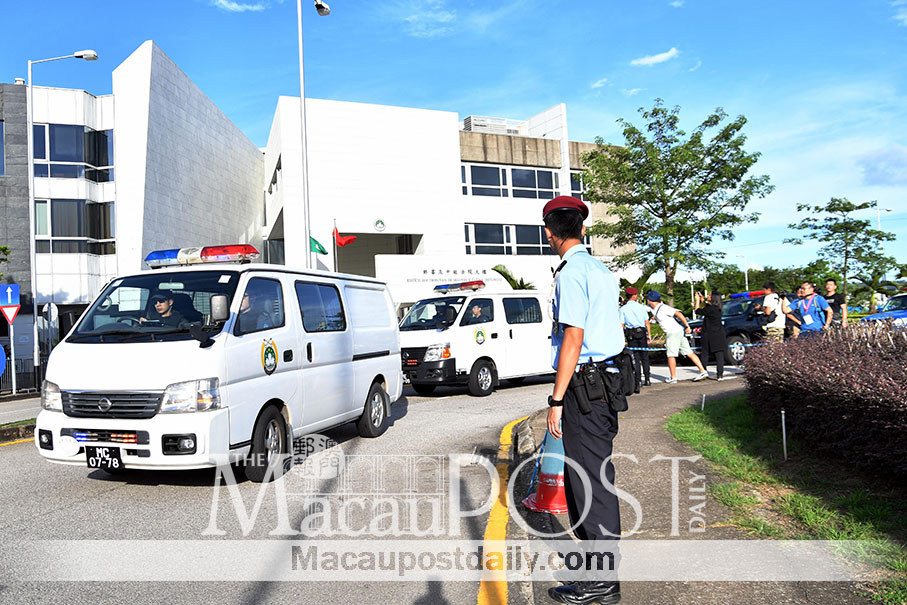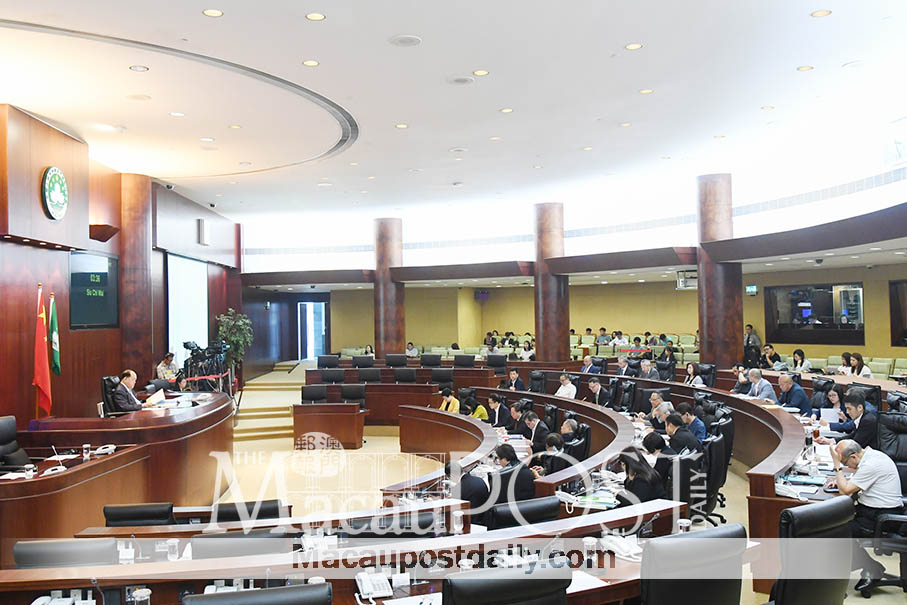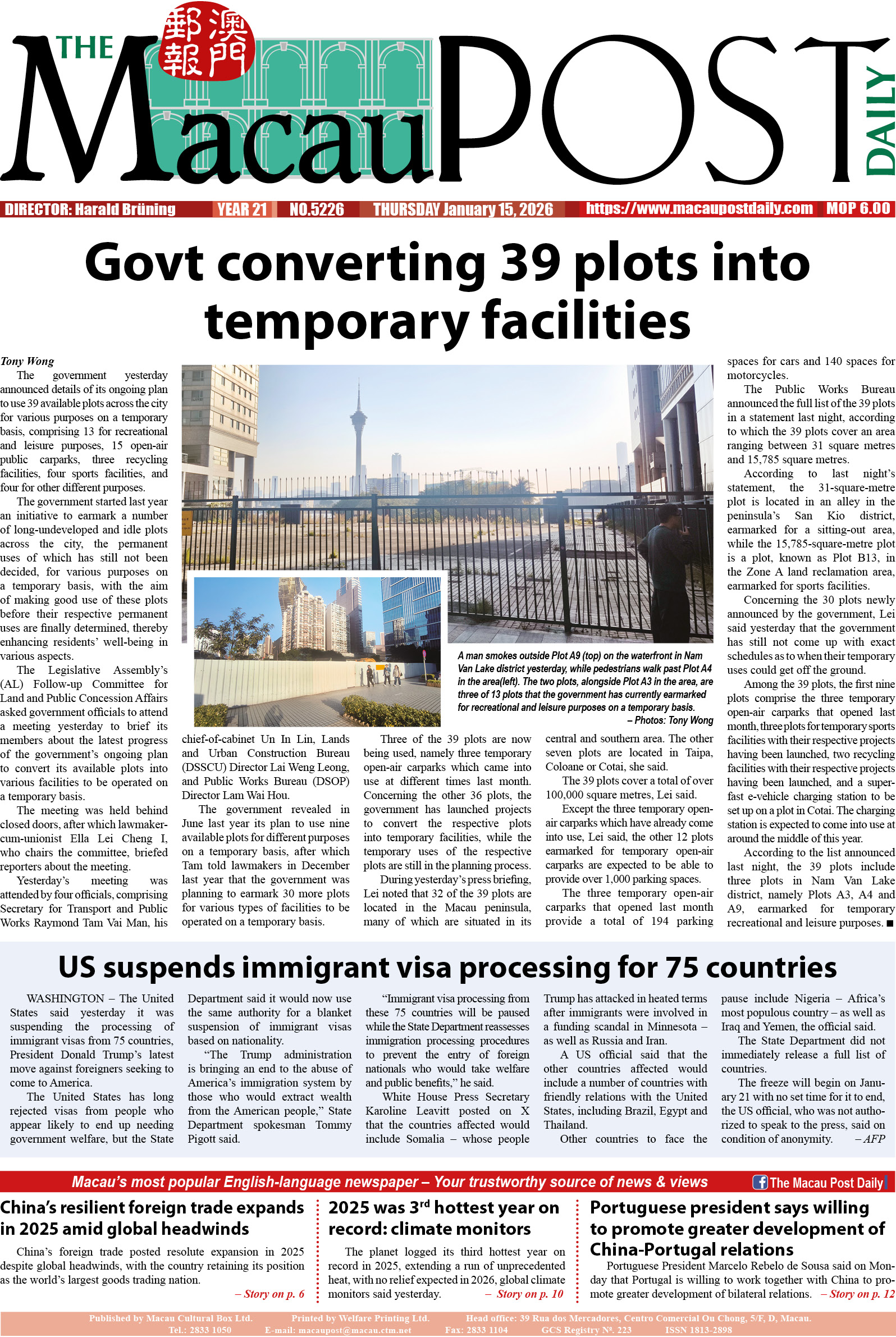Addressing yesterday’s press conference about Macau’s novel coronavirus situation, Alvis Lo Iek Long, a clinical director of the public Conde de São Januário Hospital Centre, said that the government has carried out a string of measures in preparation for a possible COVID-19 rebound in Macau as winter is approaching, including a contingency plan to set up a makeshift hospital with 500 beds for COVID-19 patients.
Lo also said that the government cannot disclose the possible location for the possible makeshift hospital for the time being, but it will certainly choose a location far away from residential neighbourhoods.
Lo made the remarks when asked by the media as to how the government will tackle a possible COVID-19 rebound in the city in the upcoming winter. Lo said that despite the fact that Macau’s current COVID-19 situation is “good”, residents should not let their guard down and the city has to readily prepare for any possible COVID-19 risk, amid the still serious COVID-19 pandemic elsewhere. Lo pledged that the government will continue to stick to its COVID-19 prevention and control principle of guarding against imported cases and the possibility of locally transmitted cases.
Lo underlined that the government has carried out a raft of measures to prepare for a possible COVID-19 epidemic in Macau. Firstly, the government has been constantly increasing its COVID-19 testing capability, which has now been raised to almost 30,000 people per day, Lo noted, adding that the government can further raise the number of nucleic acid tests (NATs) per day by arranging overtime work in case of emergency situations.
Secondly, Lo said, the government has further increased the number of “high-standard” isolation beds from 232 to 266. The government runs isolation beds in the public Conde de São Januário Hospital Centre and the Public Health Clinical Centre in Coloane.
Thirdly, the government has purchased sufficient medicine for COVID-19 treatment, and has strengthened training of its medical workers for COVID-19 prevention and control tasks, Lo said.
Lo also said that in response to a “possibly bad” COVID-19 situation in Macau, the government has a contingency plan to set up a makeshift hospital where 500 beds will be available.
Lo said that if the government would need to set up a COVID-19 makeshift hospital, it would certainly choose a location far away from residential neighbourhoods.
“As the possible setting-up of a makeshift hospital is not expected to get off the ground in a short time, there is no condition [for the government] to disclose any details (for the time being). But there is one point that is certainly true, the makeshift hospital will be set up in a location far away from residential neighbourhoods,” Lo said.
Macau has not recorded a new COVID-19 case for 115 days, while no local case has been confirmed in 204 days.
Crèches to reopen next month
Meanwhile, Choi Sio Un, who heads the Social Solidarity Department of the Social Welfare Bureau (IAS), announced during yesterday’s press conference that all the 41 government-subsidised crèches (also known as day nurseries) will reopen on November 3.
Choi said that during the first two weeks of the reopening of the crèches, only 50 percent of the maximum number of children stipulated by their respective licences can return. Afterwards, each crèche can gradually increase the number of children returning – depending on its operation situation – before its service can fully return to normal
The city’s government-subsidised crèches have been closed by official order since early this year when the COVID-19 epidemic emerged in Macau. However, non-subsidised crèches in the private market have not been subject to the government’s mandatory closure but they must be operating in compliance with the official COVID-19 prevention measures.
Choi said that with the assistance of the Health Bureau (SSM), his bureau has formulated COVID-19 prevention guidelines for the government-subsidised crèches that they must comply with after their opening.
Choi said that as it is not suitable for children aged below three to wear a facemask for a long time, the crèches will have to ensure that the children always stick to one-metre social distancing. Depending on the actual situation in the facilities, the crèches will also have to set up separation boards so as to strengthen the children’s protection, Choi said.
According to Choi, the crèches will have to designate particular staff to look after particular children. Choi said that the crèches can only provide the children with a basic service, without any interactive activities.
Quarantine for MGP racers
Meanwhile, Lo also pointed out that racers from Hong Kong competing in next month’s Macau Grand Prix (MGP) will have to undergo 14 days of quarantine and medical observation at one of the government’s “quarantine hotels” upon arrival in Macau, adding that during the 14-day quarantine period, each of them will have to undergo at least two nucleic acid tests. Lo said that therefore they would pose an “extremely low” risk to a possible COVID-19 community transmission in Macau.
Lo reassured residents that they will not need to worry about the Hong Kong racers as the neighbouring special administrative region’s COVID-19 epidemic has eased.

Alvis Lo Iek Long, one of the three clinical directors of the public Conde de São Januário Hospital Centre, addresses yesterday’s press conference about the city’s novel coronavirus (COVID-19) situation. Photo: GCS







